Observations of Istanbul
Posted: January 16th, 2014 | Author: ctbideas | Filed under: Thoughts | No Comments »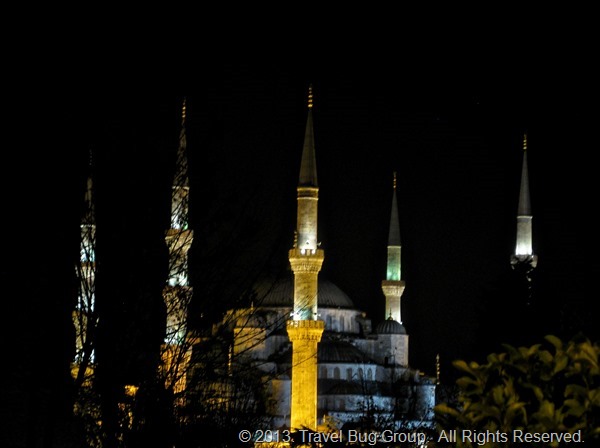
My first impression of Istanbul is how very packed everything is to one another. The houses seem squeezed together as if someone had lifted up the ends of the land like a blanket and all the houses had slid to the middle. Even though the landscape seems so cluttered with buildings, Istanbul is beautiful. The Turkish people have a flair for displaying their surroundings to the utmost. At night, the Blue Mosque is lit up like a Disneyland fairytale castle and the Hagia Sophia looms like a great protector. Even the most mundane areas of daily life are arranged in such a way as to set off their best features. Walking through a fresh market, the fruits and vegetables are laid out meticulously, each one placed neatly by hand. We saw the same in a fish market, the heads & tails of each fish all facing the same direction, the gills pulled out in dark-red lines as an easy way for customers to spot freshness. There seems to be a national sense of aesthetics: orderly, meticulous, and geometric. It’s so delightful to me when I discover a small hidden corner in Istanbul as lavishly decorated as the greatest national treasure.
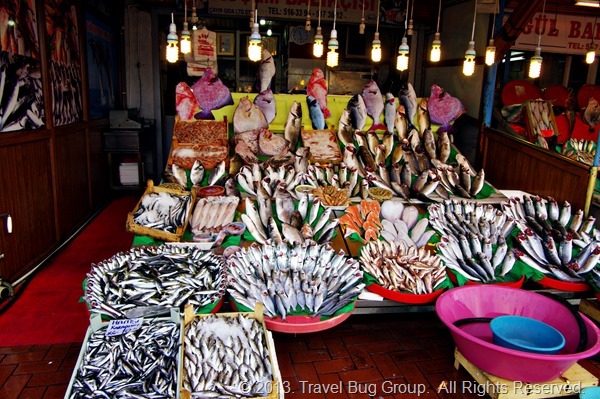
Oktay, our earlier guide, once said "Turkey may be a Muslim country, but we are liberal Muslims." And it’s true, the relaxed liberal attitude pervades throughout their culture. Tea plays a big part of it. While on tour with Oktay, he made it a habit to take tea in the middle of the day. At the Grand Bazaar, we noticed small empty tea glasses beside the door of many shops and sturdy young men flying by with silver trays full of those same tea glasses, both full and empty. We’ll walk by a pier in Eminonu, and there’ll be a small area with squat tables surrounded by people sitting around drinking tea. Even while Rick enjoyed his haircut, we all sipped our nice cups of hot tea at the same time. Turkish tea, pronounced "Chai" but spelled Cay, is quite good and often taken with a couple cubes of sugar which are always readily available at any place that serves the tea. I, myself, preferred their apple tea, which tastes like sharper hot apple cider, or rosehip tea. Another delicious drink I think anyone should try, especially on a cold day, is Salep (or Sahlep). Salep is a sweet drink tasting like hot condensed milk and thickened with orchid root powder. I must’ve had it almost every other day, with a dash of cinnamon on top. Or, if a cool drink is what you prefer, try their limonata, a milder sweeter lemonade which pairs perfectly with a couple doner sandwiches, or their fresh squeezed pomegranate juice, squeezed right in front of you with quick pulls of the seller’s arm, tasting tangy sweet with a hint of the bitter rind in the aftertaste. The best price we found for the pomegranate juice was 1TL near the port of Istanbul (Eminonu). Get that and a grilled mackerel sandwich and it’s the freshest healthiest cheapest lunch you’ll find in Istanbul.
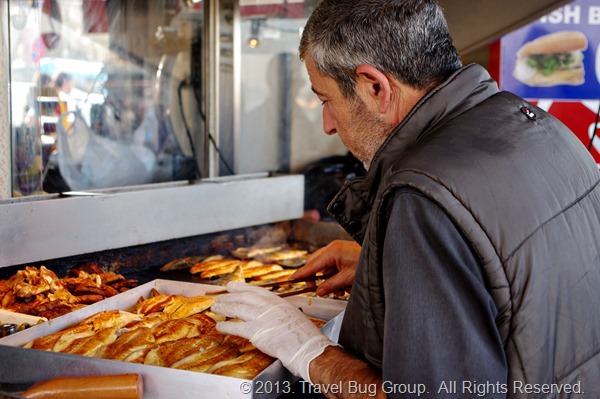
Of course, Rick will tell you it’s all about the baklava. After all, he’s tried the baklava from at least 8 different places in Turkey. The most talked about place for Turkish baklava is Gulluoglu near Karakoy and we made sure to try it. However, Rick actually didn’t prefer it as much as other places. We went a couple times to a cafe near the Basilica Cistern (sorry, I don’t remember the name. I’ll have to look for my receipt later if you’re curious). Rick liked ordering the Turkish tea and a plate of baklava, while I’d order the strawberry shortcake and a piping cup of hot chocolate, bitter and thick and yummy. We’d sit there and talk about everything, surrounded by other chattering groups, a mix of locals and tourists.
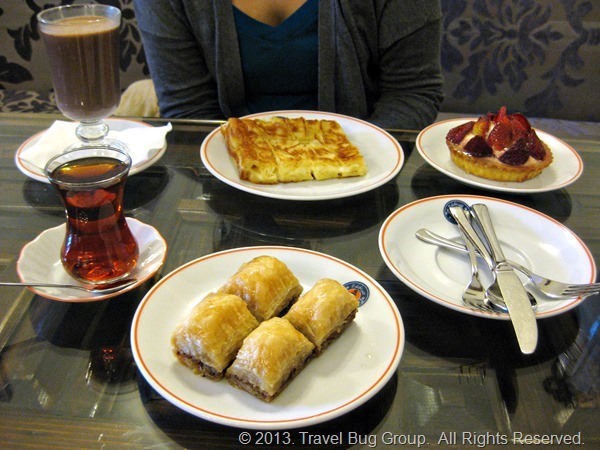
For snacks, try the stalls of roasted chestnuts, hot and chewy. If you’re like my mom and prefer the less-sweet chewier variety of corn, the roasted corn is delicious too. Or get a large slice of pineapple on a stick for 1TL. What I love about Turkey is that there is a plentiful of healthy low-cost food & snack options, and everything we tried tasted delicious (even if we weren’t quite sure what it was sometimes).
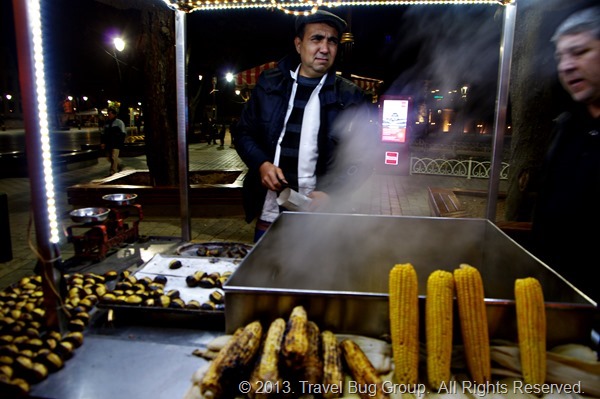
We did notice, however, some lingering reminders that the culture is predominantly Muslim in terms of gender imbalance. While riding public transportation, about 70% of the riders were male. Rick, who is the ultimate feminist, once commented to me, "I have not yet seen a woman drive by us." Alerted to that observation, I spent the next few days peering in the windows of all the cars passing by us, and Rick was right. Not once did I see a woman at the wheel of a car. On a later tour, composed of 5 women and 2 men, we fell into a discussion of gender inequality. One woman from Malta said she once boarded a long-distance bus alone and was dismayed to discover that the entire rest of the passengers were all male. No one acted inappropriately towards her, but she said it felt very awkward. Another older woman from South Africa said that she never saw any other woman her age walking around outside once the sun had set. Perhaps we are all wrong in our impressions, but it’s interesting that other tourists had sensed the same thing we had.
In Turkey, no matter their personal beliefs or political party they support or even their ethnicity, they all love their Ataturk (for which the Istanbul airport is named). Ataturk actually means "Father of Turks" and was given as a name to Mustafa Kemal, the first president of Turkey. He was similar to Napoleon in that he was a military officer coming from a middle-class background, who quickly rose through the ranks and ended up leading the country. However, he differed from Napoleon in that he focused on transitioning Turkey into a multi-party representative democracy (when he could’ve easily taken over as a Caliph) along with forcing the country into modernity by giving women the right to vote along with changing the country’s alphabet from Arabic to a Latin alphabet among other reforms. The Turkish people revere him, with portraits or statues of him in every major place along with almost every shop we entered. His face is on all the banknotes. At the exact time and date of his death, November 10 at 9:05am, most vehicles and people pause for one minute in remembrance. The clock in the bedroom where he died at the Dolmabahce Palace is still stopped to that time. So, more than anything, be careful not to say anything disrespectful to anyone in Turkey about Ataturk, or they’ll react as if you’d insulted their blood-related father.
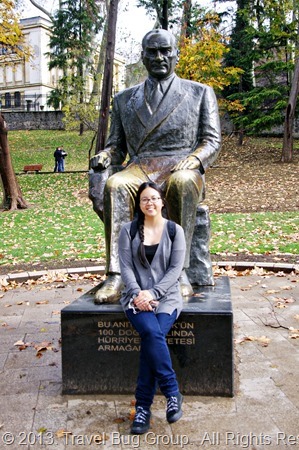
Another early impression we had of Istanbul is the overwhelming solicitation pushing at us from every direction. Especially in the Sultanahmet area, along with other major tourist attractions, I felt like I was under a constant deluge of "Comes": "Come here" "Come look at my store" "Come eat at my restaurant" "Come on this boat tour". As soon as I’d glance in a store window or even turn my head in the direction of a restaurant, someone would hurry over in my direction to try and convince us to try whatever it was they had on offer. Now, I understand that this is probably a result of the tourist-driven economy and fierce competition, but it was rather overwhelming to me. Sometimes, we would simply shake our heads and they’d nod back. Other times, they would follow us for up to a block, pushing and pushing, the whole time with a smile. The worst times for me, however, were when it came out of the blue. Like when we’d stop to ask for directions to a nearby attraction, and a man would kindly point it out but before we could go, he’d say "But first, please, please, come look at my shop. Just look. Come here. Oh, and that restaurant you want to go to is ok, but look, my friend has another restaurant that’s even better". Or someone would smile and ask where we were from and right in the middle of a really great conversation, he’d break off and say, "Hey, by the way, my shop’s here, come take a look" and when we’d say "No, thank you", his response would be "Why are you being like that? Weren’t we having a nice conversation? Why don’t you want to come to my store?" You’re probably thinking, "Why is this so bad?", but by the end of our stay in Istanbul, I would automatically look for ulterior motives. Anytime someone did something nice to us, we would immediately ask "Is this free or not?", and we would sometimes go out of the way to avoid talking to people because we didn’t want to deal with turning them down eventually (and maybe even having to deal with them following us for a bit). It was like everyone was so nice and helpful, but with an air of self-interest to it all. It made me feel cynical and paranoid, which is not how I want to interact with other people while we’re exploring new countries and cultures. I actually preferred the Mongolian way: brash and curt but nothing else behind it except genuine helpfulness.
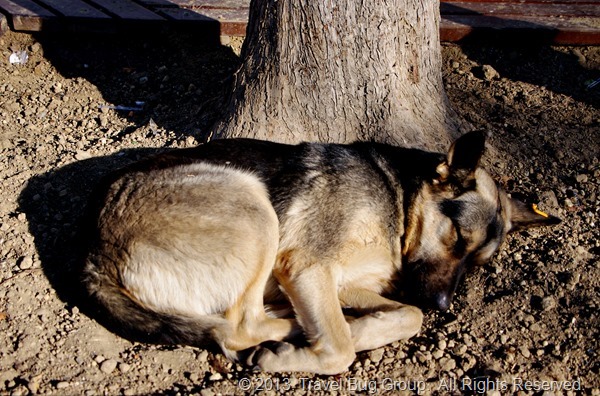
On the other hand, I adored all the stray cats and dogs that teem the streets of Istanbul. They ask for attention also, but in a different way. Or perhaps I am just better attuned to animals than to people as others have told me in the past. Most of the dogs and cats we encountered in Istanbul are super friendly. They all have their own little territories, so we saw the same ones day after day. They became so familiar to us, we ended giving them all names. Rick’s favorite was El Bastardo, a huge shaggy off-white old dog with a scraggly tail. It was love at first bite. He lunged for Rick’s knee and Rick adored him forever thereafter. But Rick’s love was always doomed to be one-sided since El Bastardo only likes girls. He’ll sidle up to them with sly dark eyes, wagging his tail. He’s the only one of the stray dogs we saw without a tagged ear (or evidence of a past tag). You’ll see the brightly-colored tags on the stray dogs’ ear. We’re still not sure what the tags are for, but we suspect it’s to mark them as spayed/neutered. The cats are friendly too. Too friendly. They’ll climb all over you and snuggle into your lap, but can get a bit violent if removed from their comfy spot. All the strays are generally well-fed looking (no protruding ribs or strange diseases that I could tell) and all with their own interesting personalities. I once remarked to Rick that the attitude in most of the countries we’ve travelled through seem to have such a laissez-faire hands-off policy towards strays, and the strays seem healthier and more well-behaved for it. Perhaps, if we adopted the same attitude towards our own strays, or even other people’s dogs for that matter, we’d have less high-strung tense pets in the States and much healthier happier strays.
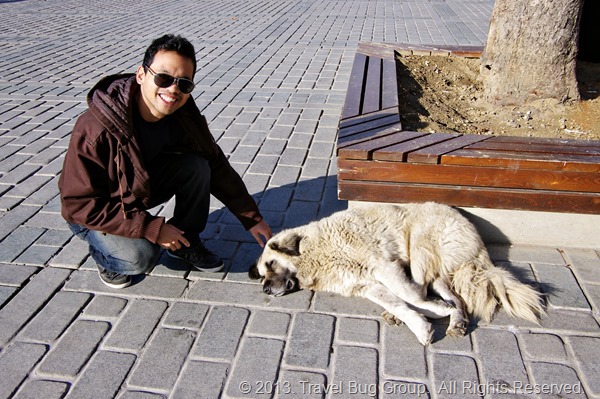
Overall, we both enjoyed Istanbul very much and hope to return for another lengthy visit to discover more of this city’s history and culture. And Rick can be reunited with his El Bastardo.
Leave a Reply